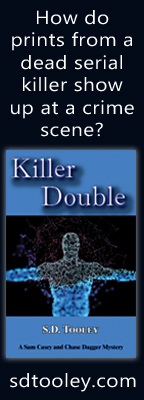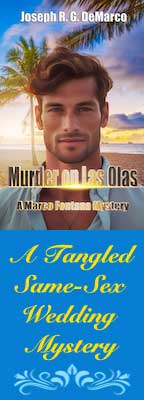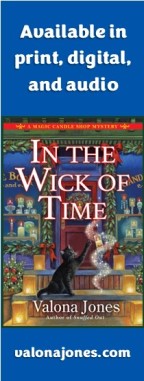by Madeline McEwen-Asker
We hope you enjoy this never before published short story featuring a mother, for Mother’s Day, from mystery author Madeline McEwen.
My mom radiated anticipation, like a carthorse promoted to the racetrack, but we were at the mall. She was the only die-hard monarchist I’d ever known in my nine short years, but this apple fell from the tree and bounced into the American republic.
“Don’t show your ignorance, Elizabeth,” Mom hissed. “It’s called a corsage,” she said, even though I hadn’t asked her anything. She pronounced corsage with great emphasis and precision as she did so many important words, ones I didn’t know. We stood together in a crush of shoppers pinned against the rope barrier all hoping to catch a glimpse of the Queen in the flesh and perhaps shake hands with royalty. I’d been practicing my curtseys for weeks, but they were still crap.
My mother, an anglophile, had dragged me to the mall for the opening of The King’s Arms, a specialist grocery store designed to look like an old fashioned English pub. In reality, the store was no more than a fancy facade–a miracle of particle board. I liked the bottle-glass windows, though they looked like plastic.
“Here she comes, emblematic, so dignified,” Mom said in a breathy voice, “Her Royal Highness, Queen Elizabeth, your namesake.”
I watched a middle-aged woman, a look-alike, not a celebrity, come closer. She didn’t seem much like the portrait that used to hang on our living room wall; no jewels or medals. This queen wore lilac-colored clothes from neck to knee, with matching bag and shoes, fresh flowers pinned to her chest–the corsage–and an improbable crown nestled in her white-grey curls. What worried me were the massive golden scissors in her hands.
Muzak wafted through the mall and then static crackled through the speakers, followed by a blast from a marching band. I recognized it immediately and Mom burst into rapturous applause. “Listen to that,” she said. “You wouldn’t know, but that’s the British national anthem, ‘God Save the Queen.'”
All I heard were the lyrics to, “My Country, ‘Tis of Thee.” I knew it by heart, even the last verse. Someone would have told me if I’d been singing the wrong words or the wrong tune. Still, better not to bad-mouth Mom. I figured this was about as near as she’d ever get to royalty. Mom’s threats to take us all to Buckingham Palace never panned out because of something called the, “change rate,” two dollars for every one pound. Seemed like a dumb deal to me.
I didn’t want to spend my vacation in Europe. They had a lot of rain and I didn’t have an umbrella, and Disneyland was in Paris, France, not England. The two countries were separated by the English Channel making England an island. That pretty much sunk my enthusiasm.
Besides, I had an Australian friend, Mimi Candy, at school. She knew an incredible amount about England, all of it bad: the food was disgusting, the people were ugly and mean, and hated all children. Mimi’d actually visited Europe with her Mom. There, they made fun of Mimi’s accent, teased her about the way she looked and generally made her life a misery. I think that’s why she called them “whinging pommie bastards.” I liked the sound of it, especially the way she said it. I liked the way she talked, her red hair, and her freckles. What’s not to like?
Once I asked Mom straight. “Why do you hate Australians?”
Mom bristled; Dad answered. “Rugby, soccer, and cricket in a nutshell,” he said. “Mom hates sport.”
Mimi loved cricket. She taught me how to bowl over-arm in the living room. That’s when the Queen’s portrait got smashed above the piano. I needed to practice more–bowling, not the piano.
“I don’t hate Australians,” Mom had said, “Although they were all criminals, deported and dumped in that desert of a colony. But hate is too strong a word.”
“Is dislike better?” I asked, hoping to get on her good side.
“It’s a question of language,” she said. “They’re so coarse. Australians are like diamonds in the rough, whereas we are fine gemstones, exquisitely cut and polished.”
“That’s right,” Dad snorted, “we’re buffed.”
Mom slapped him on the head. Would they divorce like Mimi’s parents? I hoped not.
Mimi sometimes came over after school. I wasn’t allowed to go to her house because Mrs. Candy was a single parent and a bad influence. Mimi’s Mom, Myrtle, used to be an actress. Myrtle means victory, or being a winner. I don’t know what Mimi means. I should ask her.
Myrtle wasn’t famous or anything, but she’d traveled all over the world. Now she worked in commercials so they got lots of free stuff. Mimi always shared her booty with me. I called her Magnificent Mimi, M and M candy goodness. I wished we could be best friends.
I meant to tell Mom about the accident with the picture, a full confession, but I didn’t want to spoil my new friendship with Mimi. She had smashed the portrait of the Queen, not me, but it was my fault. “No balls in the house!” I’d broken the rule, another one. I wasn’t going to get Mimi into trouble with Mom, so together we heaved the piano away from the wall and picked up all the pieces of glass. That’s when Mimi slashed her hand. She didn’t cry. I cleaned her up and gently put a Mickey Mouse Band-aid on the cut. I wish I’d cut myself too, then we could have rubbed our wounds together and become blood-sisters. I wanted to be like Mimi, bold and brave, and bursting with energy.
Meanwhile, the fake queen cut the red ribbon across the door of The Kings Arms. People clapped and someone wolf whistled. Mom used to buy all her English stuff at the English store on Campbell Avenue until they went bust a couple of years ago. Mom was deprived of all the little luxuries of life, or what she considered luxuries–weird smelling soap, fancy tea bags and a whole load of bizarre things, like minced meat in a jelly jar.
This was how I knew Mimi was right about British food. Mom forced us to eat the stuff she bought there, but she stopped trying when we’d moaned enough.
“Bloody philistines,” she had said, “You wouldn’t recognize a decent marmalade if I spread it on your stomach.” Mom did that to me once, yanked up my T-shirt and smeared gunk all over my tummy, something called Piccalilly–lumps of cauliflower in thick yellow vinegar–revolting.
From where I stood in the mall, the queen didn’t look much like her portrait, not that I’d ever taken much notice.
I spotted Mimi wriggling her way through the crowd to the front wearing a red cowboy hat and eating a cup of ice-cream from a nearby stall. I jumped up and down, waving wildly. She waved back leaning against the barrier of the roped-off area where the queen was corralled. I gestured “come over” to Mimi. She shook her head. There were too many people anyway. Maybe we could meet later. I waggled my wrist-watch, exaggerated, like we did in school. Shaking her head, Mimi pointed at the queen, then stabbed herself in the chest with the plastic spoon and curtsied. Hers was much better than mine. Maybe she’d been practicing too. 
Could I ask Mom for an ice-cream? Would she notice if I slipped away? Better not risk it, not today. What flavor had Mimi chosen? If only I could have a hat like hers. I wished I had half her power. How could I make her like me? I wanted the gift of her friendship so badly. Someone who made me feel bright and sparkly, not dim and dull. Why didn’t I know how to make her like me?
I watched amazed as the queen glided over to Mimi, singling her out, the first person she spoke to, giving her a little hug. Lucky Mimi; poor Mom.
“I don’t see what’s so special about Mimi,” Mom said. “And why is she wearing that ridiculous hat? Someone should have taught that girl better manners. Still, what can you expect with a mother like…” She didn’t finish. I was glad she didn’t. I didn’t want to hear anything bad about Mimi or her mom. Everybody loved Mimi. Why didn’t Mom?
The queen walked gracefully along the line of out-stretched hands, slowly. At her current speed, we’d be stuck here forever.
“You do know,” Mom whispered, “we’re related.” She spoke out of the corner of her mouth like a ventriloquist, her face all screwed up like an amateur.
“Course,” I said, for want of something better. “I’ve stopped believing I’m adopted.” Which was true.
“Idiotic child,” she snapped. “Not you and me.”
“Then who?”
She nodded towards the lady in lilac.
“You mean her?” I said. “How are we related?”
“Not her, the actress,” Mom said, exasperated. “Her, the Queen.”
“The real queen? Are we related? How? Cousins or something?”
Mom lifted her chin and looked down her nose at me with the arched eye-brows of a-woman-who-knows-but-ain’t-gonna-say.
“Mom,” I whined, pulling on her sleeve, winding it into a tourniquet with my finger the way she hated. “You can’t leave it like that. Tell me.”
“Surely you recognize the resemblance?” She shook me off and smoothed the easy care wrinkle free fabric on her arm.
“All you have to do is put two and two together.”
How was four supposed to help?
“It all stems from your great-grandmother,” she said. “She spent most of her life in the palace.”
“Which palace? The one Dad calls ‘Buck House,’ or the other place?”
“Your father knows nothing about history, and even less about Balmoral Castle,” she said, then relented. “Let’s just say, what flows in your veins is blue.” She inclined her head, bird-like.
I think Mom inherited her weirdness from her mother, the funny words and mannerisms and what Dad called snobbiness. That kind of thing happens a lot when people emigrate to the States. Someone comes over from Lithuania or wherever and the parents, the immigrants, want to fit in, work hard and get on. At the same time they’re starting a new life they also breed. They want their kids to know about where they came from, their old country. That’s where it all goes wrong. The kids either get too much of the old country, or only selected highlights, the best bits. I think that’s what happened to Mom.
Blue veins. I didn’t like the thought of blue, not inside me, the same as the sickly disinfectant blocks Mom put in the toilets. My curiosity had to wait because the crowd inched forward. The queen had been persuaded, reluctantly, to sign autographs.
Mom dove into her purse and rummaged around. Other people had their autograph books ready, complete with pen. Mom wasn’t about to be out-done by the competition.
“I must have something in here somewhere,” she moaned. “I never thought for a moment the queen would agree to sign autographs. It’s so out of character.”
I didn’t know if it was or wasn’t. All I knew was that getting the signature of some nobody dressed-up like the queen wasn’t worth wasting a perfectly good page in an autograph book. The queen edged her way along the line. A little kid put his chocolaty hand on her skirt leaving a monkey-paw print. I laughed.
“Have some decorum,” Mom said. “She’ll hear you. What are you laughing at?”
I stuck out my index finger before I thought.
“Don’t point. It’s rude. It’s especially unforgivable to point at the queen.”
So many rules. I remembered the first bit. I’d never heard of the second. How could I be expected to know all the royal rules too? I was glad we lived in a republic.
“You keep your hands to yourself when she arrives,” Mom said.
“Can’t I shake hands too?”
“No, you most certainly may not. The poor queen gets worn out by all that hand shaking. She needs to save her energies for those who really appreciate her, like me. Besides, you don’t want to end up like that little boy, do you?”
“The chocolate hands boy. Why?”
“You watch, they’ll drag him away discreetly, as soon as this is over.”
“Drag him away where?”
“You can’t go man-handling the queen and get away with it, you know?”
“But he’s only a boy, a toddler, not a man. And he didn’t handle her, only touched her.” Why was Mom so mad? “What will they do to him?”
“Hard to say. If we were in England, they’d lock him away in the tower, but here, maybe they’ll send him up the river and stuff him into Sing Sing.”
“But he won’t be able to see his Mom if they take him to New York. That’s cruel.”
“That’ll be the least of his problems. He should be grateful they’ve got rid of Old Sparky.”
“Who’s Old Sparky? Does the jail have a dog?”
“Don’t be so stupid, Elizabeth. Old Sparky was the electric chair. It’s all rehabilitation now, more’s the pity. They’ll have a tough time rehabilitating that little reprobate. Treason is a capital crime either side of the pond.” My mother was becoming increasingly difficult to understand using longer words like a secret code to confuse me.
“What’s ‘treason’?”
“Punishable by death. Now close your cake-hole. Here she comes.”
My mother dipped into a curtsey and offered her hand to the queen. I felt like I was watching a play at the theater. “Your Majesty,” Mom said, “this is an honor. I’m your greatest fan.” Greatest dumb-ass, I thought, keeping silent with my hands in my pockets.
“Good onya,” said the queen in an unmistakable Australian accent.
My mother shuddered. She looked a pale. I saw stiff cords standing out on her neck from chin to collar. “But,” Mom said, “you’re Australian.”
“That’s right,” said the queen.
“But the Queen doesn’t have an Australian accent.”
“True,” said the queen, “but I’ll tell you a secret. I’m not really the Queen.”
“I know, but even so, you’d think they’d have hired someone with an English accent.”
“It wasn’t supposed to be a speaking part, just snip the ribbon and run.”
I liked the queen. She was fun. Mom, on the other hand, had a red flush on her throat, tight lips, and a twitch at the corner of her eye. “Then why don’t you shut up and go home,” Mom shouted.
A murmur shivered through the people before complete silence blanketed the crowd.
“Don’t go all fruit loops on me lady,” said the queen. “You’re making a right whacker of yourself.”
“‘Whacker,’ means idiot,” I told my mother who needed help.
Mom clamped her hand over my mouth, “Not another word, Elizabeth.”
“Oh,” said the queen. “There’s only one little girl I know called Elizabeth–other than me I suppose.” She giggled.
“You must be Mimi’s best friend, are you?”
I swallowed hard. Could it be true? Had Mimi told the queen I was her best friend? Told her my name? I thought my heart would explode in my chest. This was better than meeting a fairy godmother, someone who made dreams come true.
“Did she say that?” I said. “When?”
“Probably,” said the queen, forehead crumpling in an effort of finding one tiny fact, “after your play-date when Mimi cut her hand. You did a great job with the Band-aid. Proper little doctor you’re gonna turn out to be.”
“She’s not going to be a doctor,” blurted Mom. “She’s going to be a historian, a teacher, specializing in the monarchy.”
News to me. Teaching was boring. I liked the sound of being a doctor.
“Just a minute,” Mom said to me. “Is that why there was blood in the sink that day?”
“Only a little bit” I said. Please don’t let my lies be found out. I’d wrapped all the broken glass in a newspaper and stuffed them at the bottom of the trash. “I cleaned it up like you always tell me and wiped it with bleach.”
“Funny you having my portrait on your wall,” the queen said to me. “Hope I don’t come to the same bloody end as her, but thanks for taking care of Mimi. I’m still trying to find a replacement picture for you,” she said to my mom.
I held my breath. There was no stopping it now. The truth was bubbling to the surface.
“Replacement?” Mom said.
“Yes,” said the queen. “Pity, but girls will be girls, won’t they? Got to expect a few accidents when you’re practicing your top spin.”
“Elizabeth!” Mom gasped. “You broke my precious portrait,” she said, fists clenched, “and then lied about it.”
“Can’t be that precious, Mom. You hadn’t even noticed it was missing. Anyway, I didn’t lie, exactly.”
Mom paused, opened her mouth and then closed it again. She turned to the queen and said, “How do you know about my picture?”
“Because Mimi shares everything with me. There are no secrets between me and my daughter.”
“You’re Mimi’s mother?”
“Yes,” she said, poised and polite, oozing sophistication. “Pleased to meet you. I’m Myrtle Candy from Darling Harbor, Queensland.”
Watch for a Mother’s Day mystery short story this weekend!
















0 Comments